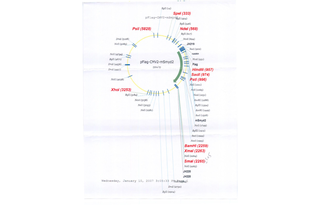-
Depositing Lab
-
Publication
-
Sequence Information
Full plasmid sequence is not available for this item.
Ordering
| Item | Catalog # | Description | Quantity | Price (USD) | |
|---|---|---|---|---|---|
| Plasmid | 13521 | Standard format: Plasmid sent in bacteria as agar stab | 1 | $85 | |
This material is available to academics and nonprofits only.
Backbone
-
Vector backbonepFlag-CMV2
- Backbone size w/o insert (bp) 4700
-
Vector typeMammalian Expression
Growth in Bacteria
-
Bacterial Resistance(s)Ampicillin, 100 μg/mL
-
Growth Temperature37°C
-
Growth Strain(s)DH5alpha
-
Copy numberHigh Copy
Gene/Insert
-
Gene/Insert nameSmyd2
-
SpeciesM. musculus (mouse)
-
Entrez GeneSmyd2 (a.k.a. 1110020E07Rik, 4930402C15, KMT3C, Zmynd14)
-
Tag
/ Fusion Protein
- Flag (N terminal on backbone)
Cloning Information
- Cloning method Restriction Enzyme
- 5′ sequencing primer CMV fwd, pCEP_fwd (Common Sequencing Primers)
Terms and Licenses
-
Academic/Nonprofit Terms
-
Industry Terms
- Not Available to Industry
Trademarks:
- Zeocin® is an InvivoGen trademark.
These plasmids were created by your colleagues. Please acknowledge the Principal Investigator, cite the article in which the plasmids were described, and include Addgene in the Materials and Methods of your future publications.
-
For your Materials & Methods section:
pFlag-CMV2-Smyd2 was a gift from Shelley Berger (Addgene plasmid # 13521 ; http://n2t.net/addgene:13521 ; RRID:Addgene_13521) -
For your References section:
Repression of p53 activity by Smyd2-mediated methylation. Huang J, Perez-Burgos L, Placek BJ, Sengupta R, Richter M, Dorsey JA, Kubicek S, Opravil S, Jenuwein T, Berger SL. Nature. 2006 Nov 30. 444(7119):629-32. 10.1038/nature05287 PubMed 17108971
Map uploaded by the depositor.




